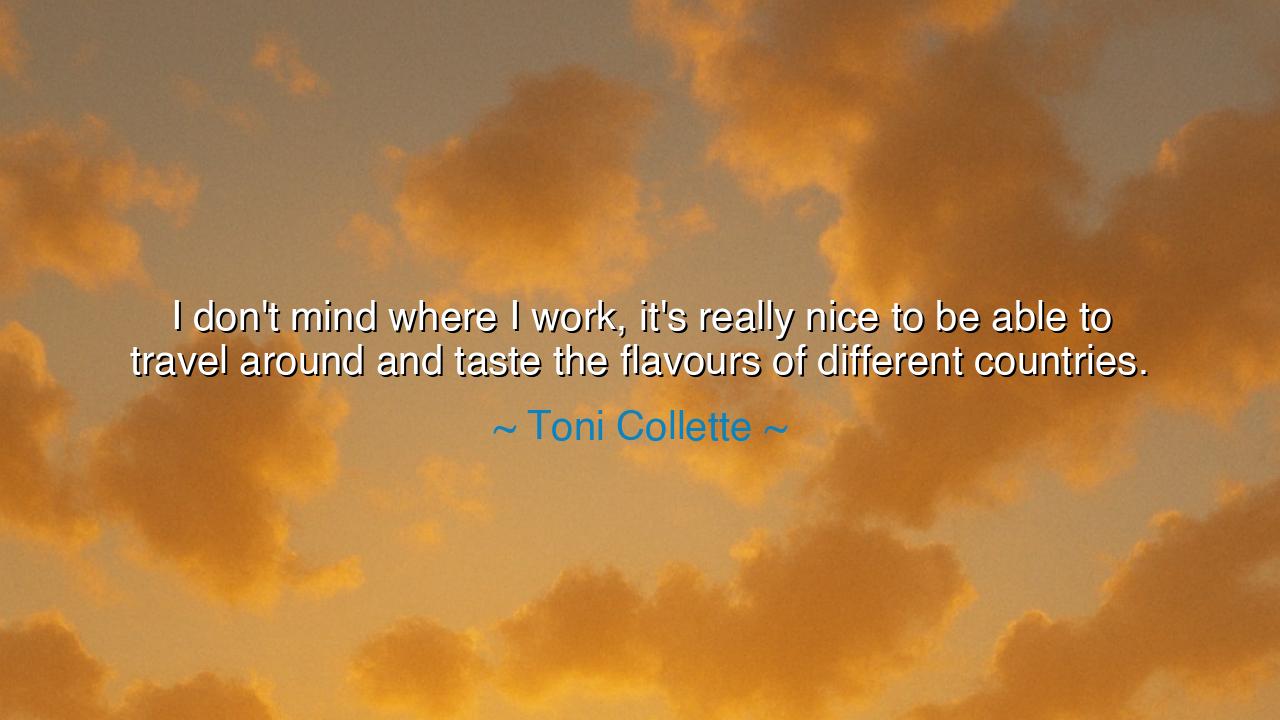
I don't mind where I work, it's really nice to be able to travel
I don't mind where I work, it's really nice to be able to travel around and taste the flavours of different countries.






Hear the words of Toni Collette, spoken with humility and delight: “I don’t mind where I work, it’s really nice to be able to travel around and taste the flavours of different countries.” In these words, there is more than the life of an actress moving between sets; there is the voice of the eternal traveler, who finds joy not in permanence but in motion, not in the sameness of each day but in the endless variety of the world. She reveals a truth that has guided sages, explorers, and dreamers for centuries: that to taste the world is to live more fully.
Mark this well, O listener: to travel around is not only to shift one’s body from one land to another, but to expand the horizons of the spirit. And to taste the flavours of different countries is not only to eat food but to receive the essence of a culture. For each dish carries the memory of a people, their soil, their traditions, their joys and struggles. A spice is not only a taste; it is a story. A recipe is not only nourishment; it is heritage. Collette’s words remind us that food is the most intimate gateway into understanding the heart of another nation.
Consider the story of Marco Polo, who returned from his journeys across Asia not only with tales of emperors and cities but with descriptions of spices, noodles, and flavors unknown to his homeland. The people of Venice were astonished, for through his words they did not just imagine distant lands—they could almost taste them. In this way, food became the bridge between worlds, as it remains today. Collette’s joy in tasting the world continues this timeless tradition: the discovery of culture through the simple act of eating.
Think also of Anthony Bourdain, the modern wanderer of kitchens and streets, who traveled the earth to share meals with people of every nation. He did not seek luxury, but authenticity—the flavors of families, of marketplaces, of traditions passed quietly from generation to generation. His journeys taught the world that breaking bread together is the oldest and truest form of diplomacy. What Collette speaks of with gratitude, Bourdain lived with passion: that the flavors of the world can dissolve barriers and create kinship among strangers.
Yet there is another truth hidden in her words: “I don’t mind where I work.” To live in such a way is to be free of attachment to place, to accept that one’s labor is not diminished by unfamiliar surroundings. Many resist the unfamiliar, clinging to what is safe and known. But Collette embraces the gift of movement, seeing each place not as a burden but as an opportunity. This openness transforms work from drudgery into adventure, from mere duty into discovery.
The lesson for us, O children of wisdom, is clear. Do not cling too tightly to one place or one way of life. Seek instead to broaden your soul by opening yourself to the world. When you eat, taste not only with your tongue but with your spirit—ask what stories lie behind the flavor. When you travel, do not remain on the surface but seek the hidden truths written in markets, kitchens, and family tables. For in these simple encounters lies the essence of humanity.
Therefore, let Toni Collette’s words be a guide: embrace travel, embrace flavor, embrace openness. Do not mind too much where life places you, for every place is rich with something to teach. Carry gratitude, not complaint; curiosity, not fear. For when you taste the flavors of the world, you are not only eating food—you are tasting history, culture, and the very soul of humankind. And in such a journey, every road, every meal, every moment becomes a blessing.






AAdministratorAdministrator
Welcome, honored guests. Please leave a comment, we will respond soon